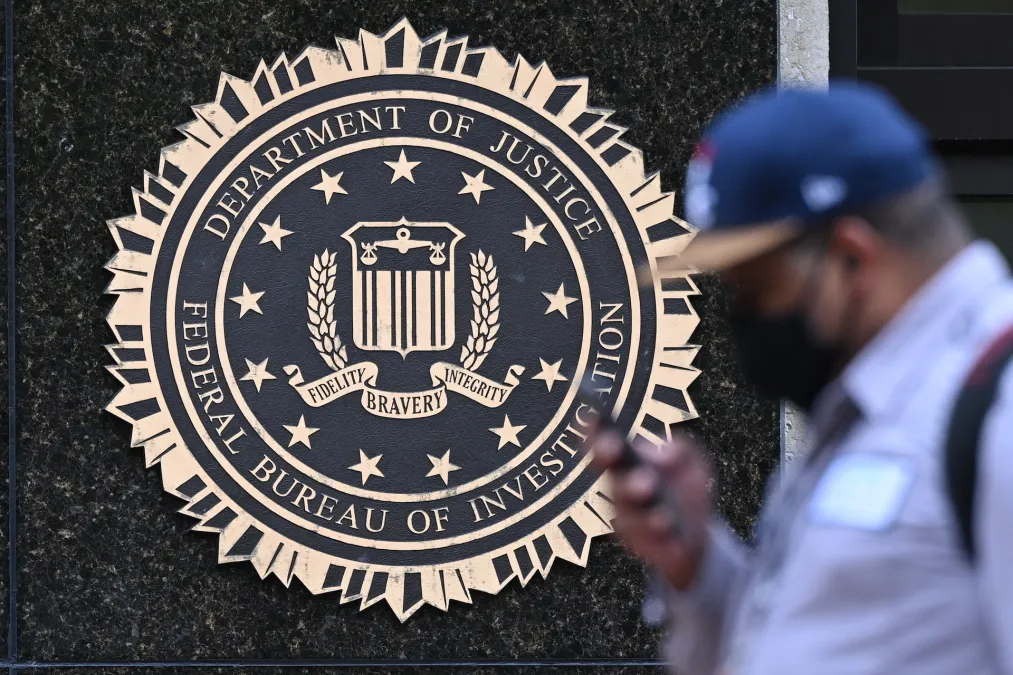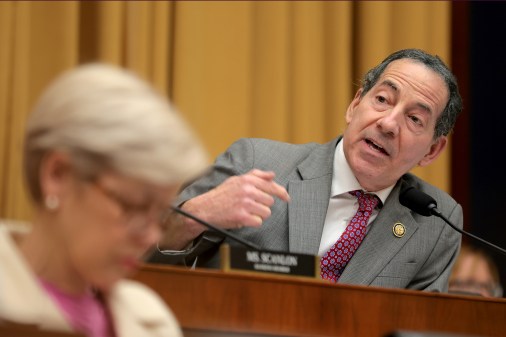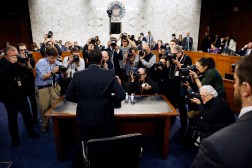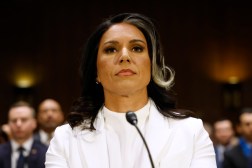Privacy watchdog recommends court approval for FBI searches of spy data

The Democratic majority of a presidentially appointed privacy watchdog recommended in a report issued Thursday that Congress overhaul a controversial surveillance law to require court approval for searches of data belonging to U.S. persons.
The recommendation by the Privacy and Civil Liberties Oversight Board may shape efforts in Congress regarding whether to renew Section 702 of the Foreign Intelligence Surveillance Act, a powerful spying tool that expires later this year and allows intelligence agencies to collect the communications of non-U.S. persons abroad whose communications transit American telecommunications systems.
The Biden administration and members of the intelligence community describe the tool as essential to the nation’s security, including its use in combatting cyberattacks and combatting the fentanyl crisis. Civil liberties advocates argue that the law has granted far too much power to the government to collect communications and that data belonging to U.S. persons often end up being swept up by a law meant to authorize surveillance of foreign targets.
Thursday’s report recommends that the Foreign Intelligence Surveillance Court, a secret judicial body that reviews intelligence requests, use current FBI search standards stating that agents are only allowed to search for data on U.S. persons if they reasonably suspect it may generate foreign intelligence information or evidence of a crime to consider and approve the bureau’s requests to search data collected under Section 702 for information belonging to U.S. persons.
Currently, the FISC reviews compliance with these standards after searches for data belonging to U.S. persons, which include all legal U.S. residents, are carried out. Requiring court approval to carry out these searches would likely reduce the amount of U.S. person data made available to the FBI via Section 702.
PCLOB has recommended that reforms for court approval come with two exemptions, including if a substantial portion of FBI queries are related to victims and if law enforcement has victim consent to carry out searches. These exemptions seemingly address long-held complaints from the intelligence community that a court approval requirement would impede investigating ransomware attacks.
Speaking Thursday in Washington, Sharon Bradford Franklin, the veteran privacy expert who chairs the PCLOB, described the reforms as “critically important to ensure the query aspects of the Section 702 program are on sound constitutional footing and protects Americans’ right to privacy in their communications” and urged Congress to incorporate the board’s suggestions in re-authorizing the law.
The report was passed along a 3-2 vote, demonstrating a deep divide over the issue of court approval. The two Republican members of the PCLOB sharply dissented from the report, including the recommendation to require court approval and called the measure “contrary to the evidence and unmoored from the law.”
“We strongly disagree with the majority of the Board, which has not focused on the actual risks at hand,” board members Beth Williams and Richard DiZinno said in a statement. “Nevertheless, the Section 702 program is so valuable that not one Member of this Board believes Congress should allow it to lapse.”
The White House also expressed concerns about the recommendation.
A senior White House official speaking on the condition of anonymity called the suggestion for court approval “deeply concerning” and described such a requirement “as the worst of both worlds,” leaving agencies sitting on national security information used to “protect lives, protect companies, guard against espionage” for weeks while waiting for court approval.
The official declined to say what other reforms the White House is weighing beyond codifying the 2021 FBI reforms but said that the discussion with lawmakers “needs to be a conversation that happens in good faith communication.”
Thursday’s report was welcomed by civil liberties groups, who argued it validated their long-standing arguments about the need for reform. “The message of the Board’s report is clear: individualized judicial review of U.S. person queries is critical to protect Americans’ rights and prevent further abuses,” a coalition of rights groups including the Electronic Privacy Information Center, Demand Progress, the Center for Democracy and Technology, Free Press Action and the Brennan Center wrote in a statement. “The report flatly rejects the government’s self-serving claim that individualized judicial review is unworkable.”
The FBI’s well-documented misuse of data collected through Section 702 has put the law in the crosshairs of lawmakers and critics, who argue that it should only be renewed with significant reforms. In May, the court tasked with overseeing America’s foreign surveillance released a heavily redacted 2022 opinion detailing more than 278,000 violations in 2020 and 2021 by the FBI of rules for accessing FISA intelligence.
The violations included the use of Section 702 intelligence against Black Lives Matter protestors and January 6 participants, which has fueled a desire for reform on both sides of the aisle in Congress.
In theory, requiring court approval of searches could limit misuse.
“Although Section 702 is touted as a foreign intelligence tool, it is apparent that a key feature is domestic intelligence and criminal law enforcement,” Board Member Travis LeBlanc said in a statement. “Such a program warrants court approval of individual U.S. person queries, which would reduce compliance errors, promote accountability, and build public trust in a surveillance program long beleaguered by a wide range of privacy and civil liberties threats.”
At the heart of the debate over reforming Section 702 is whether to require pre-authorization for searching data collected under the law. A number of members of Congress as well as civil liberties advocates have expressed support for a warrant requirement calling for probable cause in queries of U.S. persons data, a step beyond what the PCLOB is recommending.
But Franklin, the board’s chair, said in a statement accompanying the release of Thursday’s report that she supported adding a warrant requirement to searches of U.S. persons data, though the broader board did not back that recommendation.
Sen. Ron Wyden, D-Ore., said in a statement that reforming U.S. surveillance authorities requires overhauling more than just Section 702 and consideration of other, broader surveillance authorities. Welcoming the report, Wyden said that “Section 702 can be reformed while also ensuring that Americans are protected from threats, whether from terrorism or in cyberspace.”
The intelligence community and White House officials have said a warrant requirement would be detrimental to national security, and the White House has thrown its support behind codifying internal reforms by the FBI to curb abuse, which the bureau claims resulted in a 96% drop in 2022 of queries to 702 data.
The majority report sharply contrasts with a report from the President’s Intelligence Advisory Board in July, which concurred with the White House in supporting codifying new FBI compliance standards. The Presidential Intelligence Advisory Board also recommended removing the FBI’s authority to conduct queries for non-national security-related crimes.
However, it rebuked calls for a warrant requirement, calling it “not only impractical” but “unjustified.”
Other recommendations from PCLOB’s Thursday report include requiring the NSA to examine methods for estimating the incidental collection of U.S. persons data, something both Congress and civil liberties advocates have long demanded. The board also recommended that Congress codify a White House executive order from last year outlining twelve legitimate objectives for signals intelligence collection.
The board’s recommendations also include calls for reform at the FBI, including codifying the 2021 compliance reforms, requiring ongoing training, and additional review by the DOJ and ODNI of compliance.
Recommendations from the dissenting members of the board include that Congress enact a criminal statute for those who leak protected Section 702 data and that the intelligence community adopt new rules to protect against misuse of Section 702 data for “political purposes.”
Jeramie Scott, a senior counsel at the Electronic Privacy Information Center, said Thursday’s report “puts to rest any debate over requiring judicial review approval before accessing American’s communications acquired without a warrant” but cautioned that “reforming Section 702 alone will not address the broader warrantless surveillance ecosystem that affects Americans and their communities every day.”
The report arrives as the clock winds down for Congress to decide whether to renew the surveillance authority, which is set to expire at the end of the year. Lawmakers are expected to introduce legislation to reform the authority in the coming weeks, and Thursday’s report is likely to help frame debates on the issue.
Some Republican lawmakers have expressed resistance to renewing the authority at all, while others including House Judiciary Chairman Jim Jordan, R-Ohio, have joined with Democrats, including Senate Judiciary Chair Dick Durbin, D-Ill., in opposing renewal without significant reforms.
The PCLOB report is a potential blow to the White House, which has positioned the failure to renew the authority as a significant intelligence failure that would put American lives at risk.
PCLOB was established by Congress in 2004 in response to a recommendation of the 9/11 Commission Report and made an independent agency in 2007. Franklin, the board’s chair, was confirmed in February 2022, restoring the board to a full quorum after it went more than a year without one.
PCLOB has played an essential role in raising privacy and civil liberties concerns about intelligence programs, providing the public with a rare view into some of the intelligence community’s most closely guarded work. In addition to reviewing Section 702, it notably conducted a comprehensive review of the NSA’s warrantless surveillance program in 2014, finding that the program lacked a “viable legal foundation” and had failed to meaningfully contribute to any specific terrorism investigations.
Updated, Sept. 28, 2023: This article has been updated with comments from a coalition of rights groups, with remarks from Sharon Bradford Franklin at a Washington event, and a statement from Sen. Ron Wyden.






